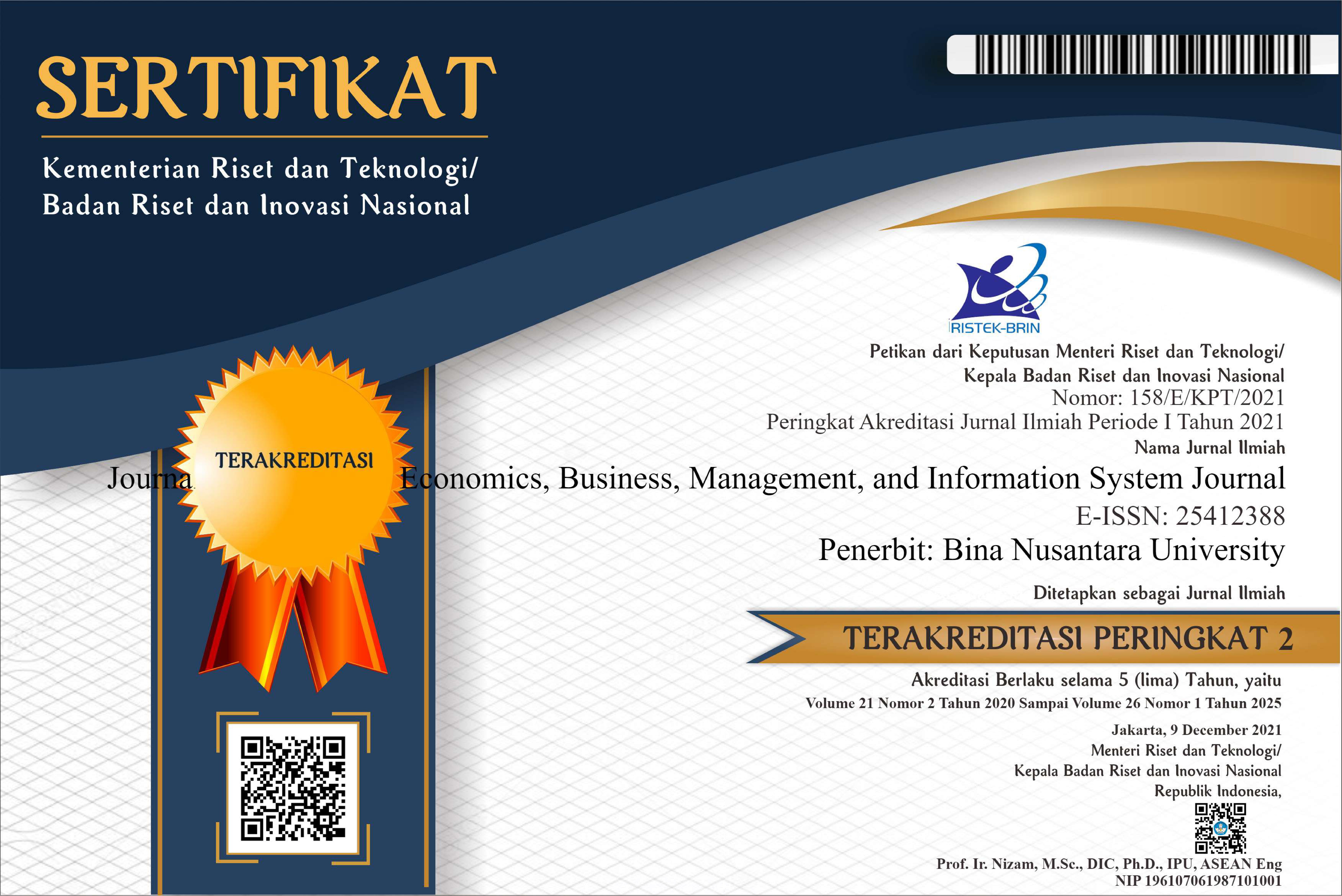The Implementation of Training and Development Program: A Study Case at PT Bank Negara Indonesia Branch
DOI:
https://doi.org/10.21512/tw.v19i1.4631Keywords:
implementation, training and development, training program, development programAbstract
This research discussed the implementation of training and development programs in an organization. Undertaken deep interview as a method, it was reviewing the training and development programs of PT Bank Negara Indonesia Cabang Pasar Klewer di Surakarta (BNI CPKS) that covered the nature of training and development programs, training and development process, and behavioral aspects of the process. This research used the qualitative approach, consisted of literature theories and previous researches also explored analysis from the author by deep interview to 15 employees including management level of existing company’s unit/departments. The analysis was undertaken through collecting data first, presenting the training and development programs and then comparing them with the relevant theories. By having a well-implemented training and development programs, it was hoped that the effort would result from the accomplishment of short-term, midterm, and long-term goals of the company. As the conclusion, the work of training and development programs at BNI CPKS in overall is considered poor. The Human Resource Management, which is under administration level has no right to run its main responsibilities, which are to coordinate and arrange company’s training and development programs. Almost process of training and development program is set by central (Jakarta) or regional (Semarang) office. In addition, the behavioral aspect negatively affects to the training and development programs of BNI CPKS, inducing all management levels to participate the training and developments programs as a formality.
Plum Analytics
References
Aguinis, H., & Kraiger, K. (2009). Benefits of training and development for individuals and teams, organizations, and society. Annual Review of Psychology, 60(1), 451–474. https://doi.org/10.1146/annurev.psych.60.110707.163505.
Agung, K. H. (2006). Analisis pengaruh kualitas layanan, komitmen, dan kepercayaan terhadap loyalitas konsumen (Studi kasus pada nasabah tabungan Simpeda Bank Jateng). Retrieved from http://eprints.undip.ac.id/18047/.
Bertolino, M., Truxillo, D. M., & Fraccaroli, F. (2011). Age as moderator of the relationship of proactive personality with training motivation, perceived career development from training, and training behavioral intentions. Journal of Organizational Behavior, 32(2), 248–263. https://doi.org/10.1002/job.670.
Buchori, S., Ibrahim, M., & Saman, A. (2016). Pengaruh character education training melalui outbound training untuk peningkatan kejujuran dan integritas. Jurnal Psikologi Pendidikan Dan Konseling: Jurnal Kajian Psikologi Pendidikan Dan Bimbingan Konseling, 2(1), 12-19. https://doi.org/10.26858/jpkk.v2i1.2089.
Buckley, R., & Caple, J. (2009). The theory & Practice of Training. London: Kogan Page.
Dysvik, A., & Kuvaas, B. (2008). The relationship between perceived training opportunities, work motivation and employee outcomes. International Journal of Training and Development, 12(3), 138–157. https://doi.org/10.1111/j.1468-2419.2008.00301.x.
Elnaga, A., & Imran, A. (2013). The effect of training on employee performance. European Journal of Business and Management, 5(4), 2222–2839.
Jehanzeb, K., & Bashir, N. A. (2013). Training and development program and its benefits to employee and organization: A conceptual study. European Journal of Business and Management, 5(2), 2222–2839.
Khan, R. A. G., & Khan, F. A. (2011). Impact of training and development on organizational performance. Global Journal of Management And Business Research, 11(7), 62-68. Retrieved from https://journalofbusiness.org/index.php/GJMBR/article/view/546.
Kuvaas, B., Buch, R., & Dysvik, A. (2012). Perceived training intensity and knowledge sharing: Sharing for intrinsic and prosocial reasons. Human Resource Management, 51(2), 167–187. https://doi.org/10.1002/hrm.21464.
Kuvaas, B., & Dysvik, A. (2009). Perceived investment in employee development, intrinsic motivation and work performance. Human Resource Management Journal, 19(3), 217–236. https://doi.org/10.1111/j.1748-8583.2009.00103.x.
Salas, E., Tannenbaum, S. I., Kraiger, K., & Smith-Jentsch, K. A. (2012). The science of training and development in organizations. Psychological Science in the Public Interest, 13(2), 74–101. https://doi.org/10.1177/1529100612436661.
Sriwidodo, U., & Indriastuti, R. T. (2012). Pengaruh dimensi kualitas pelayanan jasa terhadap kepuasan nasabah. Ekonomi Dan Kewirausahaan, 10(2), 164-173.
Downloads
Published
Issue
Section
License
Authors who publish with this journal agree to the following terms:
a. Authors retain copyright and grant the journal right of first publication with the work simultaneously licensed under a Creative Commons Attribution License - Share Alike that allows others to share the work with an acknowledgment of the work's authorship and initial publication in this journal.
b. Authors are able to enter into separate, additional contractual arrangements for the non-exclusive distribution of the journal's published version of the work (e.g., post it to an institutional repository or publish it in a book), with an acknowledgment of its initial publication in this journal.
c. Authors are permitted and encouraged to post their work online (e.g., in institutional repositories or on their website) prior to and during the submission process, as it can lead to productive exchanges, as well as earlier and greater citation of published work.
USER RIGHTS
All articles published Open Access will be immediately and permanently free for everyone to read and download. We are continuously working with our author communities to select the best choice of license options, currently being defined for this journal as follows: Creative Commons Attribution-Share Alike (CC BY-SA)

















